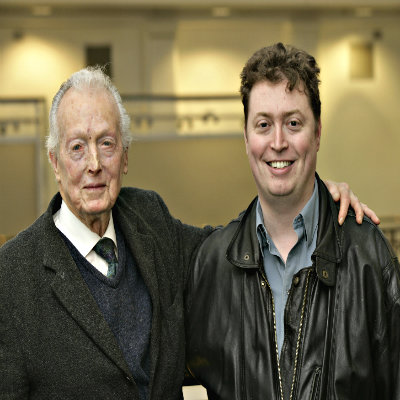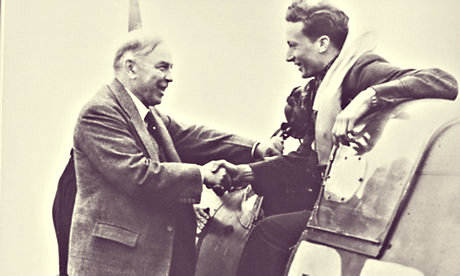Bill Ash, the adventurous native Texan who was a Royal Canadian Air Force (RCAF) pilot during WWII and had attempted over a dozen of daring escape efforts from the Nazis’ prison camps when he became a POW, passed away last April 26 in London at the age of 96.
His death is attributed to his faltering health which, according to the co-author of his autobiography Brendan Foley, had been going on for several years before his death.
Born William Franklin Ash, Bill Ash, was born in Dallas, Texas November 30, 1917. His father, according to his description, was a failed salesman so the family was in poverty. “Not so much white collar as frayed collar,” he stated. As a boy, he drifted from one job to another — from stacking shelves to working in a local newspaper office where he saw the bullet-ridden bodies of the pariahs Bonnie and Clyde.
Because Bill Ash lost his $200 savings for his college education through the 1929 stock market crash (a family friend had advised him to invest it), he worked and starved his way through college at the University of Texas until he graduated in liberal arts with honors. Bill Ash then became a hobo and a handy boxer drifting across the country through the Depression years.
When WWII broke out in Europe in 1939, Bill Ash crossed the American boundaries to Canada and signed up for the Royal Canadian Air Force (Canada was still under British empire that time). Because of that, he had to gave up his US citizenship.
He flew a British-built Spitfire together with the 411 Squadron. The said unit provided protection for Channel shipping. Bill Ash and his comrades were also responsible for escorting bombers who attacked Scharnhost and Gneisenau as the war cruisers made their dash through the Channel in broad daylight.
Though he was serving Canada and the British empire throughout the war, his American heritage stayed with him through his amiable Texan drawl which he had even until his death. He was nicknamed “Tex” by his army buddies and even carried on using that name when he became a POW.
The bold spirit Bill Ash possessed proved to be of great help to him during the war. His war exploits were not unknown. He was even visited by the Canadian Prime Minister Mackenzie King who went up on his Spitfire to shake hands with him.
The sense of adventure and dash of courage Bill Ash had was also what fueled him to make his many escape attempts when he got captured by the Germans after he was downed in 1942 when he crash-landed his aircraft during a dog fight with the enemies over France.
When he was tortured by the German Gestapo and threatened of being shot unless he gave one name of the French who helped him, he blurted out one. It was too late for them to discover that the name Bill Ash gave was that of his French teacher who was in America.
Bill Ash made 13 escape attempts from the German prison camps he was sent into. He spent so much time in the cooler (the punishment given to those who tried to escape and were recaptured) that he became known as the Cooler King.
In Stalag Luft, the Luftwaffe-controlled prison camp for aviator POWs, Bill Ash attempted three escape efforts though all them were in vain. When the Great Escape occurred, the biggest escape effort done by Allied POWs during WWII, he was spending his time in the cooler and was not able to participate.
He was able to get behind the fences of whatever prison he was placed in half of those attempts but he was always recaptured. His last escape try was in 1945 and fortunately, after marching in deep snow across a battlefield, it was a success. It was his 13th attempt. 13 was a lucky number for Bill Ash.
After the war, Bill Ash joined BBC. He became colleagues with Tony Benn who also became a lifelong friend. Later on, he became the head of BBC’s operations in India. However, as he climbed the height of his career, his marriage crumbled. In late 1950s, Bill Ash met and married Ranjana Sidhanta, an academic leftwing.
His stay in India changed Bill Ash. That, coupled with his early childhood experiences, strengthened his beliefs in Marxism. He carried his newly found beliefs when he came back to Britain in the late 1950s. Because his being a Marxist troubled BBC, his work for the network dwindled. In the 1960s, when his application for the Communist Party in Great Britain was declined, he co-founded along with Reg Birch the Communist Party of Britain (Marxist-Leninist). He became its paper’s editor throughout the 1970s.
Aside from Under the Wire, his autobiography, Bill Ash wrote several books and novels – The Lotus in the Sky (1961), Choice of Arms (1962), The Longest Way Around (1963), Ride a Paper Tiger (1963), Take-Off (1968), Marxist Morality (1988) and The Way to Write Radio Drama (1985) which is used as standard text at Soho Theater in Central London until today.

Bill Ash enjoyed his late fame as his war exploits were uncovered for the world to know when his book Under the Wire came out in 2005. However, Bill Ash never took the fame as his own. Whenever his co-author Brendan Foley would investigate one of his many adventures, he often would downplay his role in it.
Many even believed that he was Steve Mcqueen’s inspiration in the movie The Great Escape but Bill Ash thought otherwise. According to him, how could he have influenced that actor when he spent his time in the cooler when that massive Stalag Luft escape took place?
Bill Ash is survived by his wife Ranjana, his two children from his first marriage, grand children as well as great grand kids.
We salute you, Bill Ash — RCAF pilot, escape artist, activist, writer and WWII hero.
